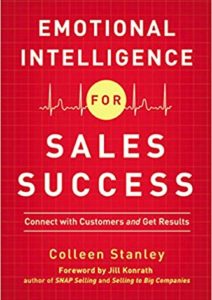CEOs and sales managers have long struggled with ensuring their sales team sells on value, not price. They hold rah-rah sales meetings that tout the benefits of the product and services. They teach negotiation skills, with the goal of salespeople standing firm on the price when meeting with a professional buyer.
So why do salespeople still discount too often and too quickly? It’s the classic case of working on the wrong end of the sales problem. Your sales team members may not lack negotiating skills – but they might lack the soft skill needed to execute hard skills: emotion management.
Here’s a scenario that happens every day in the sales profession: A salesperson meets with a prospect, who listens intently, answers questions and then lobs the price bomb. “Well, there are a lot of people interested in getting our business. Is this the best you can do?”
Without emotion management, the salesperson gets emotionally triggered and the reptilian brain — the survival part of the brain — takes over the sales conversation. The salesperson defaults to fight-or-flight responses because he is worried about losing the deal, about survival. He starts overselling and defending the price, repeating all the product benefits. This verbal vomit only makes him look like a desperate salesperson. Emotions, not effective selling and negotiating skills, are running this meeting.
The salesperson’s behavior triggers the prospect’s reptilian brain. “This salesperson seems desperate … What’s wrong with the product/service? … Why is he pushing this so hard? … I don’t want to make a bad decision … I guess I better keep looking.” Game over.
So what can you do to improve your sales team members’ ability to manage emotions?
-
- Teach them the power of self-awareness. That which you are not aware of you cannot change. Ask your sales team to slow down and review meetings where they got triggered. Was it a certain question that evoked a nonproductive response? Was it the prospect’s tonality? Body language? Remind them that triggers in the sales profession aren’t going away. However, you can change your response to them. (Click here for more information about our Emotional Intelligence For Success Boot Camp.)
- State the emotion. Research shows that by simply stating the emotion you are feeling, you can move the internal conversation from the reptilian brain to the prefrontal cortex, the logical brain, which will help the salesperson execute the correct response. “I’m feeling disrespected. I’m getting upset.” State it and you will move it.
- Pre-call planning. Salespeople are caught off guard by good negotiators because they don’t invest in planning for objections and negotiations. Sales is predictable and good negotiators negotiate. Stop being surprised and start being prepared. The more you mentally and verbally plan for a sales meeting, the more prepared you are. Preparation allows you to be in control of yourself, your emotions and your responses.
Work on the right end of the sales challenge if your sales team is selling on price. Develop your team’s emotion-management skills and pre-call planning. The result will be consistent execution of the negotiation skills, the hard-selling skills, required to win more business at the right margin with the right clients. Soft skills do produce hard sales results.
Good Selling!







Comments